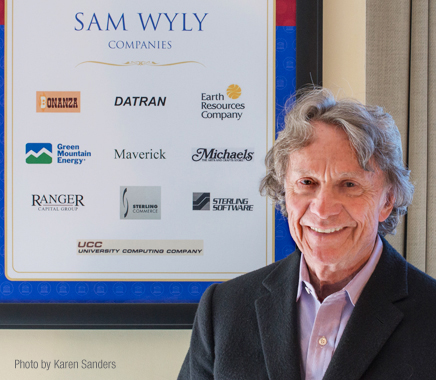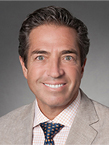© 2015 The Texas Lawbook.
By Mark Curriden
(Jan. 8) – Dallas entrepreneur Sam Wyly testified Friday that he filed for bankruptcy to force the Internal Revenue Service to “put up or shut up.”
The 81-year-old former owner of Michaels Stores and Bonanza steakhouses said he filed for protection under Chapter 11 of the U.S. Bankruptcy Code because the IRS has been auditing his tax returns for a decade without ever telling him whether he owed any additional taxes.
“The Internal Revenue Service kept my taxes open year after year and we had the $200 million New York judgment against us and I didn’t want to leave this [burden] on my children,” Wyly told U.S. Bankruptcy Chief Judge Barbara Houser.

“I filed to make the Internal Revenue Service put up or shut up,” he said.
Wyly’s testimony came on day three of his bankruptcy trial and the trial of his sister-in-law, Dee Wyly, the wife of Charles Wyly, who died in a car crash in Colorado in 2011.
Sam and Dee Wyly filed for bankruptcy in 2014 after a New York judge hit the Wylys with a $299 million judgment for federal securities violations involving offshore trusts the family created in the 1990s in the Isle of Man.
In April, the Internal Revenue Service accused the Wylys of tax evasion and fraud. The IRS seeks $1.4 billion in back taxes, fees and penalties from Sam Wyly and $800 million from Dee Wyly.
The IRS claims that the Wylys set up a series of offshore trusts in the Isle of Man in order to hide income from being taxed, but used the money in the trusts to fund their lavish lifestyle. The government claims that the trusts were sham operations that purchased multimillion-dollar houses, $700,000 pieces of jewelry and artwork any time the Wyly family demanded it.
In testimony Friday, Sam Wyly said he first learned about trusts in the Isle of Man from an article in the Wall Street Journal and from an estate planning seminar in 1991 held in New Orleans that was attended by his brother, Charles, and the family lawyer, Michael French.
“We had advice that the Isle of Man was a good place for asset protection – a place good for deferring taxes, not avoiding taxes,” he said.
Wyly told Chief Judge Houser that he and the family decided to put their assets in the Isle of Man trusts for four reasons: estate planning, asset protection, tax deferral and protection from frivolous lawsuits.
During 90 minutes of testimony Friday, Wyly emphatically stated four times that he was interested in “tax deferral, not tax avoidance.”
Wyly also said that he and his brother relied on the advice of their lawyers and accountants regarding the legality of the offshore trusts.
Chief Judge Houser is allowing Sam Wyly to limit his testimony to 90 minutes each morning because of health issues that cause him to lose energy quickly. He will return to the witness stand Monday to be cross-examined by lawyers for the IRS.
Evan Wyly, the eldest son of Sam Wyly, is back on the witness stand Friday finishing his testimony, which started Thursday afternoon.
Evan Wyly told Chief Judge Houser that lawyers for the Wyly family never mentioned any tax concerns regarding the offshore trusts the Wylys created in the Isle of Man in the 1990s.
A beneficiary of the offshore trusts, Evan Wyly testified that he was directly involved in the decision to create the trusts and that there was never any intention by the Wyly family to avoid paying taxes they owed.
“There was never any interest in breaking the law…never any mention of tax avoidance, just tax deferral,” he said.
In testimony Thursday, Evan Wyly said he and his family focused on business issues and left all legal issues and concerns to the family’s lawyers. He said he didn’t learn of the tax questions about the offshore trusts until more than a decade after the trusts were created.
“We would not have wanted to proceed if there was an intent for any type of tax evasion,” he said.
Evan Wyly also told Chief Judge Houser that he and his family understand that the assets, including the real estate, jewelry and artwork, purchased by the trusts, are owned by the trusts and that they are simply using them.
Lawyers for the Wyly family also called to the witness stand a prominent legal expert who testified this week that it is common practice for offshore trusts, such as those set up by the Wylys, to purchase jewelry, furniture, real estate and artwork that is used for personal reasons by the beneficiaries of the trusts.
Joshua Rubenstein, a partner in the New York law firm Katten Muchin Rosenman, did not address the facts in the Wyly case specifically, but he told Chief Judge Houser that it is legal and acceptable for beneficiaries to influence trustees in the purchase of luxury items.

“It’s their money and their property and it’s there for them to use,” said Rubenstein, who is a member in the International Academy of Estates and Trusts and viewed as an expert on offshore trusts.
Rubenstein was the first of several legal and tax experts expected to take the witness stand during the three-week trial, which started Wednesday.
Rubenstein said that lawyers in tax, estate and trusts practices do not consider it fraud when trusts purchase and own expensive jewelry, furniture, artwork, residences and vacation homes but then allow the beneficiaries of the trusts – in this case the Wyly family – to use and enjoy the items.
In addition, it is appropriate for the trusts to pay for maintenance and taxes on the property, he said. Rubenstein testified that he has seen no evidence that the trusts paid the Wylys’ personal expenses, such as meals or travel.
© 2014 The Texas Lawbook. Content of The Texas Lawbook is controlled and protected by specific licensing agreements with our subscribers and under federal copyright laws. Any distribution of this content without the consent of The Texas Lawbook is prohibited.
If you see any inaccuracy in any article in The Texas Lawbook, please contact us. Our goal is content that is 100% true and accurate. Thank you.
